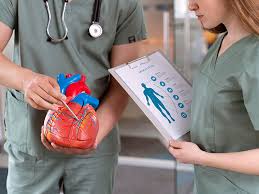Heart disease is the leading cause of death worldwide — yet many heart conditions can be prevented or managed with early detection. One of the most powerful tools in early diagnosis is the Electrocardiogram (ECG or EKG), along with regular cardiac checkups. These routine tests can detect silent heart problems before symptoms even appear.
This article will explore the importance of regular ECG and cardiac checkups, how they work, who needs them, and how they contribute to long-term heart health.
What is an ECG (Electrocardiogram)?
Understanding the Basics
An ECG is a painless, non-invasive test that measures the electrical activity of your heart. Electrodes are placed on your chest, arms, and legs to record:
- Heart rhythm
- Heart rate
- Electrical conduction pattern
What ECG Can Detect
- Irregular heartbeat (arrhythmia)
- Heart attacks (current or past)
- Poor blood flow to the heart
- Structural abnormalities
- Effects of medications on the heart
What Are Cardiac Checkups?
Components of a Routine Heart Health Check
Cardiac checkups are a combination of tests and evaluations to assess your heart function. These may include:
- Blood pressure measurement
- ECG
- Cholesterol and blood sugar tests
- Echocardiogram
- Stress test (TMT)
- Chest X-ray or CT scans (if needed)
Why They Matter
These checkups help detect risk factors and early signs of:
- Coronary artery disease (CAD)
- Heart failure
- Hypertension
- Valve disorders
- Atrial fibrillation and other arrhythmias
Benefits of Regular ECG and Cardiac Monitoring
Early Detection Saves Lives
- Detects silent heart conditions before symptoms appear
- Monitors chronic heart diseases and medication effectiveness
- Guides treatment in people with high risk
- Prevents complications like stroke or sudden cardiac arrest
- Peace of mind for those with family history or past heart issues
Who Should Get Regular ECG and Cardiac Checkups?
High-Risk Individuals
You should consider regular heart evaluations if you:
- Are over the age of 40
- Have a family history of heart disease
- Have high blood pressure or diabetes
- Smoke or consume alcohol frequently
- Are obese or lead a sedentary lifestyle
- Experience chest pain, shortness of breath, or palpitations
Frequency of Checkups
| Risk Level | Frequency of ECG & Checkups |
|---|---|
| Low Risk (healthy adult) | Every 2–3 years |
| Moderate Risk | Annually |
| High Risk or Symptoms | Every 6–12 months or as recommended |
ECG vs Other Heart Tests
Comparison Table
| Test | Purpose | When It’s Used |
|---|---|---|
| ECG | Measures electrical activity | Initial diagnosis and rhythm issues |
| Echocardiogram | Visualizes heart structure and function | Heart failure, valve problems |
| Treadmill Test (TMT) | Assesses heart under stress | Detects blockages or ischemia |
| Holter Monitor | 24-hr ECG recording | Intermittent arrhythmias |
Symptoms That Require Immediate ECG Testing
Even if you’re under 40 or not high-risk, seek ECG testing if you experience:
- Chest discomfort or pain
- Shortness of breath
- Dizziness or fainting
- Rapid or irregular heartbeat
- Extreme fatigue
- Swelling in ankles or legs
How to Prepare for an ECG or Heart Checkup
Simple and Safe
- No fasting required
- Wear loose clothing for electrode placement
- Avoid lotions or oils on your chest
- Tell your doctor about any medications you take
- Stay calm and relaxed to avoid altered readings
Myths About ECG and Cardiac Checkups
Debunking Common Misconceptions
- “I’m young and fit, I don’t need it.”
Heart issues can occur even in fit individuals — early detection is crucial. - “ECG is painful.”
It’s completely painless and only takes 5–10 minutes. - “It’s too expensive.”
In reality, ECGs are among the most affordable and essential heart tests.
Conclusion
Regular ECGs and cardiac checkups are not just for people with heart disease — they are for anyone who wants to stay healthy and live longer. These simple, non-invasive tests provide a window into your heart’s health and help detect problems before they become life-threatening. Whether you’re over 40, at risk, or just health-conscious, make ECG and cardiac checkups a routine part of your health plan. Your heart will thank you.
FAQs
1. How often should I get an ECG?
If you’re healthy, once every 2–3 years. If you’re high-risk or over 40, get it annually or as advised by your doctor.
2. Is ECG painful or risky?
No, ECG is a safe, non-invasive, and painless test that takes only a few minutes.
3. Can an ECG detect a heart attack?
Yes, it can show current or past heart attacks and abnormal rhythms.
4. Should I still get an ECG if I feel fine?
Yes. Many heart problems are silent and don’t show symptoms until it’s too late.
5. What is the difference between ECG and EKG?
There is no difference — ECG (British English) and EKG (German origin) refer to the same test.
6. Will I need more tests if my ECG is abnormal?
Possibly. Your doctor may recommend an echocardiogram, stress test, or Holter monitor for deeper analysis.
7. Can ECG detect all heart problems?
No, it’s a great initial tool, but some issues may require further imaging or tests.
8. Are ECGs covered by health insurance?
In many countries, yes. It depends on your provider and health policy.









